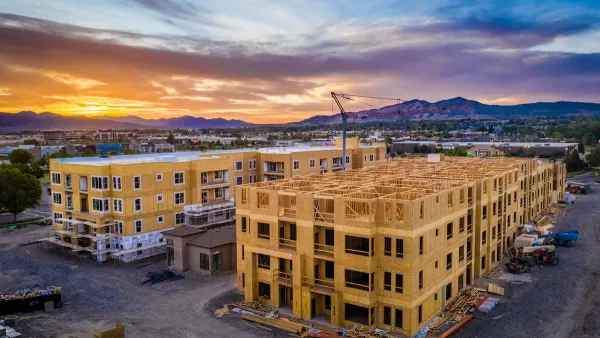The Biden administration plans to expand the federal housing voucher program, which currently provides rental assistance to 2.3 million U.S. households.

Results from a Department of Housing and Urban Development (HUD) study that began in 2008 show that "[p]riority access to a long-term housing subsidy led to by far the best outcomes for reducing family homelessness 3 years after random assignment," reports Jared Brey in NextCity. "It’s one of numerous studies that show the housing choice voucher program is an important lifeline for thousands of low-income families who might otherwise be unable to find an apartment. Despite that, the federal government currently only funds enough vouchers for about a quarter of families that qualify for the benefit. In many cities, the waiting list for a voucher is years long — or closed entirely."
The Biden administration is seeking to expand the federal housing voucher program by adding $5.4 billion to its budget "and creating vouchers for an additional 200,000 families, beyond the 2.3 million existing voucher holders." Housing advocates praise the move, citing "significant evidence" that the program works more effectively than other interventions.
The proposal still "falls short of Biden’s campaign promise calling for the voucher program to be funded so that every qualifying family can receive one," and voucher recipients face their own set of challenges. Some landlords discriminate against voucher holders, limiting their options and reducing their mobility and access to jobs and amenities. But advocates see the proposal as a hopeful sign for making rental assistance a much more substantial part of federal housing policy, while HUD Secretary Marcia Fudge said that the request "turns the page on years of inadequate and harmful spending requests" that crippled the department's ability to meet the country's housing needs. Douglas Rice, a senior fellow on the housing policy team at the Center on Budget and Policy Priorities, agrees. "I think it’s an important signal of what their priorities are going to be in terms of low-income housing policy."
FULL STORY: How Expanding Vouchers Could Improve Housing Stability

National Parks Layoffs Will Cause Communities to Lose Billions
Thousands of essential park workers were laid off this week, just before the busy spring break season.

Retro-silient?: America’s First “Eco-burb,” The Woodlands Turns 50
A master-planned community north of Houston offers lessons on green infrastructure and resilient design, but falls short of its founder’s lofty affordability and walkability goals.

Delivering for America Plan Will Downgrade Mail Service in at Least 49.5 Percent of Zip Codes
Republican and Democrat lawmakers criticize the plan for its disproportionate negative impact on rural communities.

Test News Post 1
This is a summary

Test News Headline 46
Test for the image on the front page.

Balancing Bombs and Butterflies: How the National Guard Protects a Rare Species
The National Guard at Fort Indiantown Gap uses GIS technology and land management strategies to balance military training with conservation efforts, ensuring the survival of the rare eastern regal fritillary butterfly.
Urban Design for Planners 1: Software Tools
This six-course series explores essential urban design concepts using open source software and equips planners with the tools they need to participate fully in the urban design process.
Planning for Universal Design
Learn the tools for implementing Universal Design in planning regulations.
EMC Planning Group, Inc.
Planetizen
Planetizen
Mpact (formerly Rail~Volution)
Great Falls Development Authority, Inc.
HUDs Office of Policy Development and Research
NYU Wagner Graduate School of Public Service





























